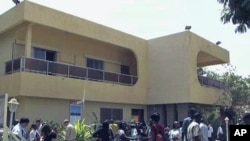In Senegal, a model “green house” is showcasing renewable energy technologies as part of efforts between the Israeli and Senegalese government to improve food production and reduce dependence on fossil fuels.
The Israeli ambassador's residence in Dakar has undergone an eco-friendly renovation to better use renewable energy. Ambassador Gideon Behar says it is a model for how people can live in balance with their environment.
“We have added first of all a system of irrigation which is called drip irrigation which uses much less water and in a more effective way. So all the garden is installed with a goutte-a-goutte or drip irrigation. In addition to that, we have added solar energy either for heating the water for showers or the kitchen uses but also solar system for the electricity of the house,” he said.
The model home includes an aquaculture project that Ambassador Behar says can help improve Senegalese nutrition. “We are growing fish. We want to show people here in Senegal that it is very possible, with small pools of water which exist everywhere in Senegal and also in Africa, that you can grow enough food, enough protein for your needs as a family,” he said.
'Solar power'
The launch of the Israeli embassy's “green house” featured Israeli businesses that are investing in renewable energy. Senegal's Minister of Renewable Energy, Louis Seck, says that is especially important here in the Sahel.
Seck says Senegal has an abundance of solar energy for pumping water, for heating water, and for running equipment like computers. So he believes the Israeli initiative is a great part of developing renewable energy in the country.
Seck says engineers are trying to combine solar power with the national electricity provider, Senelec. That is already part of a law that is being drafted to allow people to sell back their excess solar power to Senelec. Seck says the government's goal is for solar power to produce 60 percent of all household energy.
Eyal Ben-Yaacov from the Israeli firm AMN Sun Solar says solar power allows people outside Senelec's national electricity grid to have power sooner, much as cellular phones have connected villages that are still waiting for landlines.
“The problem here in Africa is the grid. And when you take an off-grid system and you bring it much faster, much cheaper to the countryside to the villages, this is something that would take years and years and years to do with the grid,” said Ben-Yaacov.
Improving daily lives
Seck says solar power can rapidly improve the daily lives of the Senegalese people.
Seck says the government is asking everyone in Senegal to be inspired by the Isreali project which promotes a new type of housing in which a big part of the energy used is generated by solar power.
Behar says renewable energy is essential to meeting the challenges of global climate change. “It's a collective effort. It is in our hands the possibility to help and to protect our environment. If we don't do it now, it will be a disaster. Senegal and the Sahel countries in Africa suffer a lot from desertification, from deterioration of soil of land of climate change. If we don't take immediate action now, there will be a big disaster for these parts of Africa,” said Behar.
The Israeli and Senegalese governments are also working to adapt new technologies to solve the country's energy crisis, as daily blackouts show Senelec's inability to meet growing demands for electricity at a time of higher oil prices.




